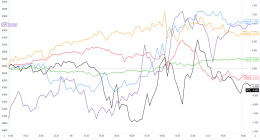
People of a sensitive disposition who are easily repulsed may have evolved this trait as a natural way of avoiding infections.
Scientists found people with a low threshold for feeling disgusted are less likely to be infected with bacteria or viruses.
This, researchers say, proves Charles Darwin’s 19th-century theory that disgust evolved as a self-defence mechanism is indeed true.
However, the disgust screening tool does not protect against all diseases, including Covid-19, because of a lack of detectable clues, such as an offensive smell or sight.


Scientists found people with a low threshold for feeling disgusted are less likely to be infected with some form of pathogen. This, researchers say, proves Charles Darwin’s 19th-century theory that disgust evolved as a self-defence mechanism is indeed true (stock)
‘We found that people with higher levels of disgust had lower levels of inflammatory biomarkers that were indicative of having bacterial or viral infections,’ said Dr Aaron Blackwell, co-author of the study from Washington State University.
‘While the study shows that disgust functions to protect against infection, it also showed it varies across different environments, based on how easily people can avoid certain things.’
Charles Darwin first came up with the theory that humans evolved a sense of disgust as a way to avoid tainted food in 1872.
Subsequent studies found disgust helps protect people in affluent parts of the world where it is possible to choose to avoid a pathogen if you think one may be present.
For example, if a packet of chicken is taken out of the fridge and has an unpleasant odour, it can be thrown in the bin as other meals are available.
However, no research had been done to test the theory in environments when people have no way to avoid similar warning signs.


‘Having a high level of disgust sensitivity protected against some kinds of infections, but not necessarily against others like parasitic worm infections that are common in this area,’ Dr Blackwell of Washington State University says (stock)
The latest study is thought to be the first to test this theory among Indigenous populations and focused on three groups of Shuars, the native people of Ecuador and neighboring Peu.
Researchers collected data from three Ecuadorian Shura communities, with participants ranging in age from five years old to 65.
All three of the communities are in what the researchers consider to be ‘high-pathogen’ environments rife with infections such as TB and roundworm but have undergone varying levels of economic development.
For example, one society was more basic, living in mud huts and was almost totally reliance on nature.
Another was more modern, with members living in concrete flats and in close proximity to a market.
All 75 people filled out a questionnaire asking them how disgusted various things made them feel, such as: watching someone vomit, touching raw meat, finding maggots in their food, and seeing a rodent where they stored their food.
Blood and faecal samples from the participants were also analysed to look for signs of infection.
It revealed the people who were less likely to be disgusted were also those who rely the most on activities like hunting and small-scale agriculture and are therefore are more likely to encounter potential pathogens.
‘Having a high level of disgust sensitivity protected against some kinds of infections, but not necessarily against others like parasitic worm infections that are common in this area,’ Dr Blackwell said.
‘It makes sense because their eggs and larvae are transmitted through the soil, and when you make your living hunting and growing your own food, soils are hard to avoid.’
‘Disgust doesn’t protect us very well against pandemics like COVID-19 in part because a lot of people are asymptomatic.
‘We don’t get any cues of what to avoid. You can’t see it.’
The full findings are published in PNAS.
This post first appeared on Dailymail.co.uk









